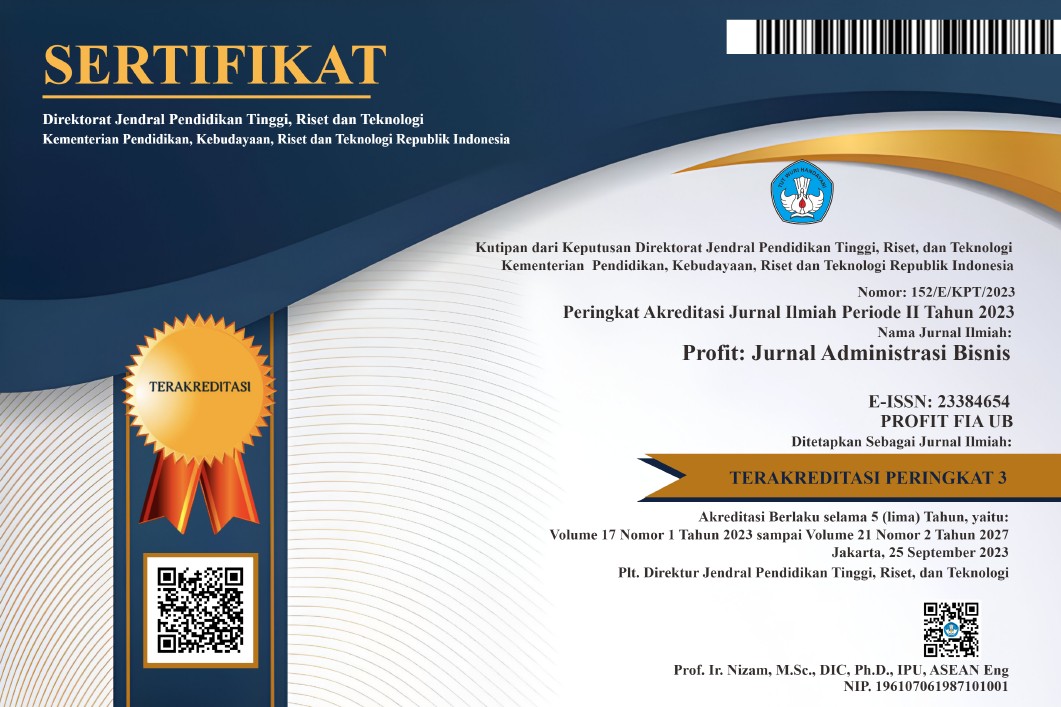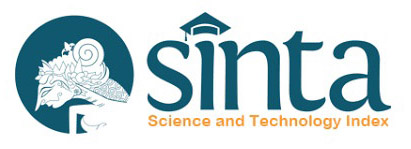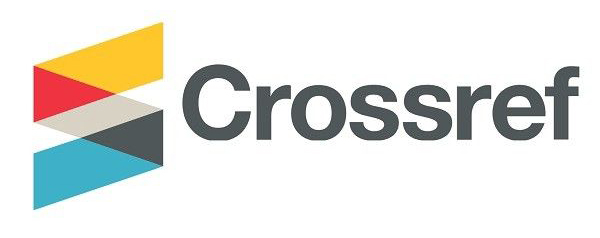KEBIJAKAN MANAJEMEN DAN REAKSI CUSTOMER TERHADAP PENERAPAN GREEN HOTEL (Studi Kasus pada Harris Hotel & Conventions di Kota Malang)
DOI:
https://doi.org/10.21776/ub.profit.2020.014.02.1Keywords:
Management Policy, Customer Reaction, Green HotelAbstract
This research is intended to indetify the reason of management for applying green hotels concept, to describe policy of management related green hotels, to analyse the obstacle that will face, to know well positive impact that will get and to explore customer reaction regarding green hotels implementation in Harris Hotels & Conventions. The researcher use describtions methode with qualitative approach, also use primary data and secondary data that was collected by observation technique, interview, and documentation. This interview was conducted to 5 persons from hotels management and 15 persons from customer. The result of this research show that The Haris Hotels implement green concept due to goverment regulation and desire to do continues environment fundamental. Harris Hotel & Conventions Malang make some policy base on building side, efficiency of energy, product selection and waste management which follow standart of Green Hotels concept, except policy of water efficiency that not yet reach maximum result. There are 5 obstacles that will face and 2 positive impact that will get from green hotel concept implementation. Beside, customer reaction  tend to support if Harris Hotels & Conventions Malang become green hotels.
References
Anggita, D., Wardhani, A., & Danusastro, Y. (2016). Penilaian Aspek Green Hotel Kelas menengah (Hotel Berbintang 1,2,3. Modul , Vol.16 No.1.
Arjana, I. G. (2016). Geografi Pariwisata dan Ekonomi Kreatif. Jakarta: Rajawali Pers.
Badan Pusat Statistik Kota Malang. (2017). Kota Malang Dalam Angka 2017. Malang: BPS Kota Malang.
Chan, E. S. (2013). Gap analysis of green hotel marketing. International Journal of Contemporary Hospitality Management , Vo.25 No.7.
Chen, Y.-C., & Chen, Y.-T. (2012). The Advantages of Green Management for Hotel Competitiveness in Taiwan: In the Viewpoint of Senior Hotel Managers. Journal of Management and Sustainability , Vol.2 No.2.
Desliana, A., Gaffar, V., & Andari, R. (2014). Pengaruh Program Green Marketing di Hotel Shangri-la Jakarta terhadap Green Consumer Behavior. Tourism and Hospitality Essentials (THE) Journal , Vol.4 No.1.
Erdogan, N., & Baris, E. (2007). Environmental Protection Programs and Conservation Practices Of Hotels in Ankara, Turkey. Tourism Management , Vol.28 Iss.2 pp 604-614.
Ferianto, A. R., Darsiharjo, & Rahmafitria, F. (2014). Pengaruh Konsep Green Hotel terhadap Minat Berkunjung Wisatawan ke Kota Bandung. Antologi Management Resort & Leisure , Vol.2 No.2.
Holcomb, J. L., Upchurch, R. S., & Okumus, F. (2007). Corporate Social Responsibility: What Are Top Hotel Companies Reporting? International Journal of Contemporary Hospitality Management , Vol.19 No.6 pp 461-475.
Kabar Bisnis. (2010). Wisata MICE Harus Terapkan Green Tourism. Retrieved 03 12, 2019, from Kabar Bisnis: https://kabarbisnis.com/read/2810335/wisata-mice-harus-terapkan-i-green-tourism-i-
Kementerian Pariwisata Republik Indonesia. (2016). Panduan dan Pedoman Pelaksanaan Green Hotel Indonesia. Jakarta: Wonderful Indonesia.
Lee, H., Jai, T.-M. (., & Li, X. (2016). Guests Perceptions of Green Hotel Practices and Management Responses on TripAdvisor. Journal of Hospitality and Tourism Technology , Vol.7 No.2.
McDaniel, S. W., & Rylander, D. H. (1993). Strategic Green Marketing. Journal of Consumer Marketing , Vol.10 No.3.
Nitisusastro, H. M. (2013). Perilaku Konsumen: Dalam Perspektif Kewirausahaan. Bandung: Alfabeta.
Polonsky, M. J. (1994). An Introduction to Green Marketing. Electronic Green Journal , Vol.1 No.2.
Robinot, E., & Giannelloni, L. (2010). Do Hotels Green Attributes Contribute to Customer Satisfaction. Journal of Services Marketing , Vol.24 No.2.
Schiffman, L., & Kanuk, L. L. (2008). Perilaku Konsumen. Edisi Ketujuh. Alih Bahasa: Drs.Zoelkifli Kasip. Indonesia: PT. Indeks.
Setiyaningrum, A., Udaya, J., & Efendi. (2015). Prinsip-Prinsip Pemasaran – Pengenalan Plus Tren Terkini Tentang Pemasaran Global, Pemasaran Jasa, Green Marketing, Entrepreneural Marketing dan E-Marketing. Ed 1. Yogyakarta: ANDI.
Sinangjoyo, N. J. (2013). Green Hotel sebagai Daya Saing Suatu Destinasi. Jurnal Nasional Pariwisata , Vol. 5.
Wu, S.-I., & Chen, Y.-J. (2014). The Impact of Green Marketing and Perceived Innovation on Purchase Intention for Green Products. International Journal of Marketing Studies , Vol.6.
Downloads
Published
Issue
Section
License
The copyright of the received article shall be assigned to the journal as the publisher of the journal. The intended copyright includes the right to publish the article in various forms (including reprints). The journal maintains the publishing rights to the published articles.

This work is licensed under a
Creative Commons Attribution-NonCommercial 4.0 International License

















